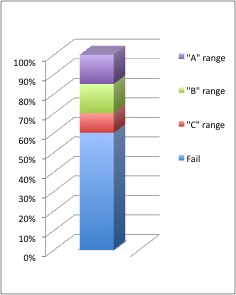Physics 116C (Fall 2017): Mathematical Methods in Physics III
Course information
Instructor: Stefano Profumo
Office: ISB, Room 325
Phone Number: 831-459-3039
Office Hours: Mondays, 1PM or by appointment
E-mail: profumo AT ucsc.edu
Teaching Assistant: Logan Morrison
Office: ISB, Room 314
Phone Number: 831-459-4138
Office Hours: Wednesdays 1PM or by appointment
E-mail: loanmorr AT ucsc.edu
Click here to download the syllabus in PDF format
Class Hours
Lectures: MWF, 10:40AM - 11:45AM, N. Sci Annex 101
Discussion Sections: Tuesday 12-1PM, Thimann 391, and Thursday 4-5PM, ISB 235
Course description
- Fourier series and transforms
- Dirac-delta function
- Green's functions
- Series solutions of ordinary differential equations
- Legendre polynomials and functions
- Bessel functions
- Sets of orthogonal functions
- Partial differential equations
Prerequisites
- Physics: 116A , 116B
- Mathematics: 23A, 23B
Required Textbook
- Mathematical Methods in the Physical Sciences by Mary L. Boas

Other Textbooks
- Mathematical Methods for Scientists and Engineers by Donald A. McQuarrie
- Essential Mathematical Methods for Physicists by George B. Arfken and Hans J. Weber
Course Outline
| Topic |
Reading |
Lecture # (tentative!) |
| Fourier series and transforms |
Boas, Chapter 7 |
1-6 |
| Dirac-delta function |
Boas, Chapter 8.11 |
7-8 |
| Green's functions |
Boas, Chapter 8.12 |
9-11 |
| Series solutions of ordinary differential equations |
Boas, Chapter 12 |
12-14 |
| Legendre polynomials and functions |
Boas, Chapter 12 |
15-17 |
| Bessel functions |
Boas, Chapter 12 |
18-20 |
| Sets of orthogonal functions |
Boas, Chapter 12 |
20-22 |
| Partial differential equations |
Boas, Chapter 13 |
23-27 |
| Review |
|
28-29 |
Course Grading and Requirements
Grades will be based on performance in the following three tasks: weekly homework, midterm, and final exam.
The tasks and their relative weights in determining the students' overall course grades are given below:
- 35% Weekly Homework (9 problem sets)
- 25% Midterm Exam (Friday November 3, lecture time)
- 40% Final Exam (Tuesday, December 12 8:00–11:00 AM)
|
In addition, up to 10% bonus will be given based upon participating in the "bonus problem" at the beginning of the weekly discussion sections.
Weekly Homework
Weekly homework assignments will be posted on Canvas each Wednesday and are due at
the beginning of class on the Wednesday of the following week, when solutions will also be posted. The homework problem
sets are (effectively) not optional, and will consist of a few (typically 10) problems from Boas' textbook.
You are encouraged to discuss the class material and homework
problems with your classmates and to work in groups, but all submitted problems
should represent your own work and understanding. Late homeworks can be submitted to the grader, but will not contribute any points to the final grade. You have one ``late-homework pass''.
The Grader will grade each homework, and is responsible for the given grade.
Grades for each homework set will consist of 2 points (mostly correct), 1 point (less than 50% correct) or 0 points (no homework returned in time).
Homework solutions will be typically made available on the course website the day after the homework due date.
Midterm and Final
The midterm exam and the final exam will be held in the same classroom as
the lectures. The midterm will be a 1 hour written exam in class (regular lecture time) on Friday November 3, on the material covered up to
Friday October 27, while the final (Tuesday, December 12 8:00–11:00 AM) will be three hours long and cover
the complete course material. Both the midterm and the final will be open-book (you can bring with you any book or notes). Laptop
computers and cellular phones of any kind will not be allowed. One or more practice midterm and final will be handed out a week before the exams. You must take the
final exam to pass the course.
The minimal score not to fail the class is 60%.
The final grade will follow the percent guideline below:
- 60% to 70%: C range
- 70% to 85%: B range
- 85% to 100%: A range
|

|
Homework exercises
FOR THOSE USING THE 2ND EDITION: CLICK HERE TO DOWNLOAD THE CORRELATION LIST OF 2ND AND 3RD EDITION PROBLEM NUMBERS FOR PROBLEMS WHICH APPEAR IN BOTH EDITIONS
Galileo's Corner
La filosofia e' scritta in questo grandissimo libro che continuamente ci sta aperto innanzi a gli occhi (io dico l'universo), ma non si puo' intendere se prima non s'impara a intender la lingua, e conoscer i caratteri, ne' quali e' scritto. Egli e' scritto in lingua matematica, e i caratteri son triangoli, cerchi, ed altre figure geometriche, senza i quali mezzi e' impossibile a intenderne umanamente parola; senza questi e' un aggirarsi vanamente per un oscuro laberinto. (Galileo Galilei, Il Saggiatore, 1623)
Philosophy (Knowledge) is written in that great book which ever lies before our eyes (I call it the Universe), but we cannot understand it if we do not first learn the language and grasp the symbols in which it is written. It is written in mathematical language, and the letters are triangles, circles and other geometrical figures, without which means it is humanly impossible to comprehend a single word; without knowledge of those, it's a useless wandering in a dark labyrinth.







